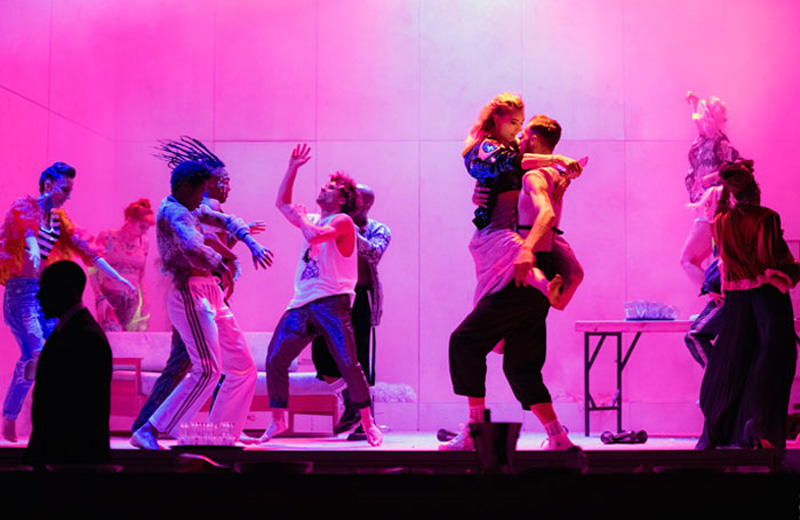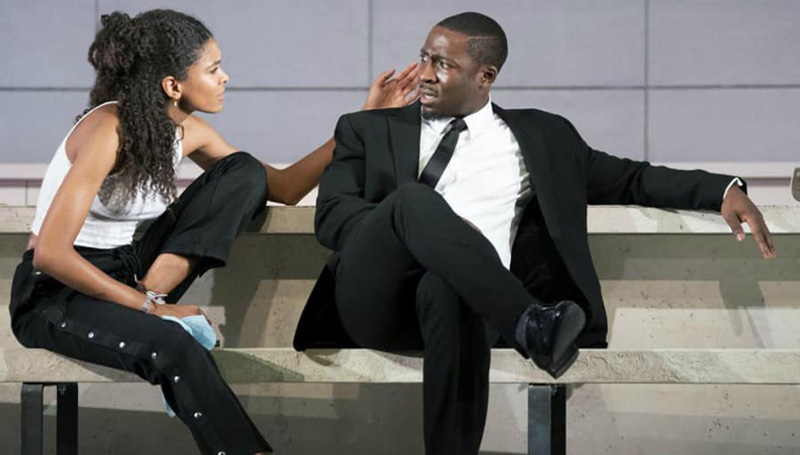“Julie”, National Theatre
Jeremy Malies on the South Bank
8 June 2018
The style of playwright Polly Stenham has been compared to Tennessee Williams and Edward Albee. Neither were strangers to the angst and mental illness that abound in Strindberg’s Miss Julie, and with her hallmark focus on dysfunctional parents, Stenham makes the unseen father figure a major presence in her treatment of this 1888 composition (now plain Julie) at the National Theatre.

Set design by Tom Scutt. Photo credit: Richard Hubert-Smith.
The last time I saw the play, the original setting of a Swedish manor house had been replaced with a farm in South Africa by Yaël Farber working for Baxter Theatre Centre, Cape Town. Stenham sets the action in a large minimalist townhouse in present-day north London. Am I now keen to see plot and locale presented as Strindberg intended? Yes, but all in good time. As long as theatrical brains as fertile as those of Farber, Stenham and Carrie Cracknell (who directs at the National’s Lyttelton Theatre) are reflecting on the piece, I’m happy to see radical adaptations.
Julie is played with charisma and a convincing vulnerability by Vanessa Kirby, seen recently on Netflix in The Crown as another irresponsible self-possessed hedonist, Princess Margaret. Kirby is helped by the fact that she is using a style of upper-class delivery that is close to her resting accent. Opposite her is Eric Kofi-Abrefa as Jean, the family chauffeur. Under Cracknell’s direction, he renders Stenham’s idiomatic naturalistic dialogue totally spontaneous with close social observation of the gulf that divides him from his employers.
Tom Scutt’s design is on two tiers, an approach that allows us to see a group of hallucinating drug-infused party-goers upstairs at the same time as we watch the main drama in the enormous modern kitchen. Guy Hoare’s lighting mimics not just the party strobes but the psychedelic effects that are presumably going through the heads of the grotesque array of guests. Few holds are barred though placing Julie’s dead canary in a food mixer is overkill in every sense.

The ensemble. Photo credit: Richard Hubert-Smith.
Stenham has enlarged the role of Jean’s fiancée Kristina (Thalissa Teixeira excellent) without compromising the overall dynamic. Kristina is far more assertive, has more lines and is willing to confront Julie full-on about her depravity. The blocking frequently sees Julie and Jean squabble from either end of the stage, a detail that makes the physical encounter when it comes all the more electric. The pair use unostentatious technique to raise the stakes for the sex which takes place off-stage in Strindberg. Here, Cracknell suggests intensity without derailing the flow of the plot. Kofi-Abrefa holds all the cards as Jean when he says that he would have preferred the conquest to have been more of a challenge.
I don’t think I have ever seen Strindberg so naturally funny with interpolated gags springing seamlessly from the core speeches as written and based on analysis of social mores. The odd line is clunky. At no time did I feel the spell of midsummer’s eve (usually a recurrent theme) and Julie’s plea to Jean that he should ‘be a bit more pagan’ could have been usefully removed from a version set near Hampstead Heath which was decidedly unpagan the last time I looked. If there is one significant misjudgement, it’s handling of the exchanges as the couple discuss their plans to run a restaurant after the elopement. In the original these are poignant but here they are played for easy laughs.
Kirby invests Julie with credible contemporary detail as she snorts industrial quantities of cocaine and swallows benzos like M&M’s while talking wittily about her family’s eccentricity. I can’t have been alone in seeing her as the late drug-abusing socialite Tara Palmer-Tomkinson who managed to be empathetic and repellent at the same time.
Yes, this is a massive reworking but there is little that is contrary to the spirit of the text. Jean impresses Julie when he quotes Aristotle to the effect that courage is the first virtue because it makes all others possible. Aristotle went on to say that knowledge is the second virtue. Stenham and Cracknell have both courage and knowledge in spades. Julie describes how as a child she used to find melted chocolates in the pockets of her summer dresses. She would press them into a new shape and give them to her mother. It’s a useful and I think conscious piece of symbolism from Stenham. The play has been investigated in an audacious and forensic manner but not warped out of its own guise.









